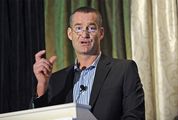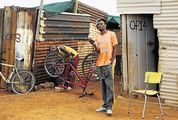BUSINESS DAY TV: Eastern Europe properties are doing exceptionally well and offer big opportunities
MARC Edwards, CEO of Tower Properties discusses their results and acquisitions in Croatia.
BUSINESS DAY TV: Tower Properties has grown its distributable earnings 72% over the six months ended November, although its distribution is up a rather less exciting 7.6% to 45.2c a share. Like its peers in listed property here, Tower has made a push into Europe. But unlike the others, it’s chosen Croatia as its expansion region of choice. Joining me now in the News Leader studio is the CEO, Marc Edwards.
Marc, firstly how do you square off that difference in distributable income growth of 72% against a 7.6% increase in distribution?
Marc Edwards: It’s the acquisition of R728m worth of property. So we basically acquired that additional income growth but the distributable income growth is based on now more shares in issue.
BDTV: Okay so you’ve got what, 60-million more shares in issue?
ME: Correct.
BDTV: So is it going to catch up though, at some stage, the distribution growth because...
ME: Absolutely...those properties were bought mid last period so between August and November, so as a full year filters out under the mat if you like, you will get your full growth through, yes.
BDTV: So has most of that acquisition activity been conducted overseas rather than SA, because I mentioned Croatia and that’s really I suppose the big feature of your results in the last few months?
ME: Yes...in our last reporting period November, the R728m was R320m in Croatia, one office property with the rest being South African assets. And we’ve just announced our biggest deal ever which was R1.1bn transaction in Croatia for four shopping centres. So that should be the biggest deal we do for a long time and takes our portfolio to about R5.2bn in size.
BDTV: Okay, so why Croatia because a lot of other property companies have expanded into central and Eastern Europe but this is a novelty for South African property?
ME: We’ve got deep contacts in the region through personal contacts which we’ve built up and we’ve been introduced to a lot of the players, so the transaction we’ve just done at the moment, the four properties are owned by a company called Agrokor which is the eighth biggest company in Europe. We have become very close with them so the pipeline we have in Croatia and the region is significant. We’ve seen a lot of South African companies going into Serbia recently, which is Croatia’s neighbour, Romania which is extremely successful, Nepi (New European Property Investments).
So the old Yugoslavia is a very close and small community and we looked at Eastern Europe mainly because we saw other South African companies like NEPI doing exceptionally well and we thought it was an opportunity for us.
BDTV: But surely it can also present challenges? I’ve spoken to a couple of Croatians and I was talking about your firm, and they said the Croatian property market is quite opaque sometimes and quite difficult for outsiders to crack. So will you continue to have a local partner there because you don’t want to run into any disputes or legal issues in a country that you don’t understand?
ME: Yes, the last thing you want to do and South Africans unfortunately have a bit of a habit of doing this...they go into other countries and try and South Africanise them. You can’t do that at all. We’ve managed to sell part of the company which we own over there, which owns the assets, 20% of that, to a local Croatian developer who is extremely well respected in the region. So we’ve got a management partner as well as an equity partner and that was crucial for us, to find the right partner in the region.
To now move on to Agrokor and have that relationship has been amazing. You’ve got to kick the tyres with the properties, you’ve got to pay your school fees in terms of people you meet. And we have met some dodgy people, make no mistake but these guys are really stand-up and high-value partners. So you wouldn’t go into a country like that, particularly with the language barrier...the legal system is actually quite similar to ours, it’s very similar to our sectional title law, so we’ve got our South African attorneys and our Croatian attorneys who protect us that way. We’ve got staff over there now who are on the ground, kicking the tyres for us, looking for opportunities, so certainly that will stand us in good stead, I believe.
BDTV: And what are the yields because the first property you bought was at a yield 8.5%. So what are the retail properties that you’ve bought?
ME: That’s right, they’re 7.5% for the retail so for a top-quality property you’ll pay 7.5% right up to 11%. The trick there is the debt...the debt is around 3.5% to 4% so you’re positively geared from day one, which allows you a lot of growth opportunity.
BDTV: Just coming back to the debt that you have on your books here, you talk about being 60% hedged and you want to move that up to 100% hedged against I suppose interest rate volatility which we do expect. Is that going to be an expensive exercise or is it an exercise that is worth undertaking?
ME: Yes, it’s going to happen by default. The reason why is that part of this acquisition we’re doing now, we’re funding at 40% debt in Croatia through Croatian or European banks which we’ve already got approval from. And the 60% we’re going to raise through our shareholders and accelerated bookbuild once the shareholders have approved the transaction. It’s a category one transaction for us. We will then take that equity that we’ll raise in SA and use it to pay down our South African debt, right down to virtually nothing. We will then borrow from our South African debt providers in euro through the European agency, against our South African properties. So what it does is effectively allows you to take money out of the country without physically taking rands out, you’re simply using your South African balance sheet as security for loans overseas.
BDTV: And do you have Reserve Bank approval to do that?
ME: Yes, so we have Reserve Bank approval on the initial deal which was the first, the VMD office property. We’ve started to apply for that process which takes six to eight weeks for the shopping centres.
BDTV: And for you is this a crucial thing to do that you actually secure the debt that you have, so you don’t come into any shocks in the future?
ME: Absolutely. So not only do we secure the debt through that way, which obviously gives you a nice yield kicker from day one because the cost of equity is more expensive than the cost of debt, but we also hedge against the foreign exchange potential issues that one can get. So you can take a collar and a cap out with a bank where you set a floor at R17 to the euro and then the bank takes a certain degree of the upside, but at least it protects you against the downside risks because we’ve got rentals coming in from Europe in euro into SA...the last thing you want is for the rand to strengthen dramatically and you take out this way.
BDTV: Just two last questions. You talk about wanting to increase the retail element of your business to 50% odd, you’re about 35% at the moment, and you want to do it quite quickly so how are you going to do that?
ME: This takes us there...this puts us at 50%, yes correct.
BDTV: And is that a mix that you’re happy with or would you want to decrease office exposure further because it’s clearly a very difficult thing for you?
ME: Yes, we’re looking at...we’ve got 48 properties at the moment and it will go up to 52 after these and we’ve got about five or six properties which we will get rid of. These are mainly outlying properties in Johannesburg, B-grade buildings which are no longer fashionable...people are moving to Sandton and Rosebank, so we will look to exit those properties. They should be in the hands of smaller, more private landlords, very small properties.
We are then still keen on office strangely. We are certainly more keen on retail than office, but we like office properties which are well located. So Rosebank is certainly an area we really like, Claremont in Cape Town, Cape Town CBD are areas which we will continue to invest in. But no longer will we buy any outlying B-grade properties.
MARC Edwards, CEO of Tower Properties discusses their results and acquisitions in Croatia.
BUSINESS DAY TV: Tower Properties has grown its distributable earnings 72% over the six months ended November, although its distribution is up a rather less exciting 7.6% to 45.2c a share. Like its peers in listed property here, Tower has made a push into Europe. But unlike the others, it’s chosen Croatia as its expansion region of choice. Joining me now in the News Leader studio is the CEO, Marc Edwards.
Marc, firstly how do you square off that difference in distributable income growth of 72% against a 7.6% increase in distribution?
Marc Edwards: It’s the acquisition of R728m worth of property. So we basically acquired that additional income growth but the distributable income growth is based on now more shares in issue.
BDTV: Okay so you’ve got what, 60-million more shares in issue?
ME: Correct.
BDTV: So is it going to catch up though, at some stage, the distribution growth because...
ME: Absolutely...those properties were bought mid last period so between August and November, so as a full year filters out under the mat if you like, you will get your full growth through, yes.
BDTV: So has most of that acquisition activity been conducted overseas rather than SA, because I mentioned Croatia and that’s really I suppose the big feature of your results in the last few months?
ME: Yes...in our last reporting period November, the R728m was R320m in Croatia, one office property with the rest being South African assets. And we’ve just announced our biggest deal ever which was R1.1bn transaction in Croatia for four shopping centres. So that should be the biggest deal we do for a long time and takes our portfolio to about R5.2bn in size.
BDTV: Okay, so why Croatia because a lot of other property companies have expanded into central and Eastern Europe but this is a novelty for South African property?
ME: We’ve got deep contacts in the region through personal contacts which we’ve built up and we’ve been introduced to a lot of the players, so the transaction we’ve just done at the moment, the four properties are owned by a company called Agrokor which is the eighth biggest company in Europe. We have become very close with them so the pipeline we have in Croatia and the region is significant. We’ve seen a lot of South African companies going into Serbia recently, which is Croatia’s neighbour, Romania which is extremely successful, Nepi (New European Property Investments).
So the old Yugoslavia is a very close and small community and we looked at Eastern Europe mainly because we saw other South African companies like NEPI doing exceptionally well and we thought it was an opportunity for us.
BDTV: But surely it can also present challenges? I’ve spoken to a couple of Croatians and I was talking about your firm, and they said the Croatian property market is quite opaque sometimes and quite difficult for outsiders to crack. So will you continue to have a local partner there because you don’t want to run into any disputes or legal issues in a country that you don’t understand?
ME: Yes, the last thing you want to do and South Africans unfortunately have a bit of a habit of doing this...they go into other countries and try and South Africanise them. You can’t do that at all. We’ve managed to sell part of the company which we own over there, which owns the assets, 20% of that, to a local Croatian developer who is extremely well respected in the region. So we’ve got a management partner as well as an equity partner and that was crucial for us, to find the right partner in the region.
To now move on to Agrokor and have that relationship has been amazing. You’ve got to kick the tyres with the properties, you’ve got to pay your school fees in terms of people you meet. And we have met some dodgy people, make no mistake but these guys are really stand-up and high-value partners. So you wouldn’t go into a country like that, particularly with the language barrier...the legal system is actually quite similar to ours, it’s very similar to our sectional title law, so we’ve got our South African attorneys and our Croatian attorneys who protect us that way. We’ve got staff over there now who are on the ground, kicking the tyres for us, looking for opportunities, so certainly that will stand us in good stead, I believe.
BDTV: And what are the yields because the first property you bought was at a yield 8.5%. So what are the retail properties that you’ve bought?
ME: That’s right, they’re 7.5% for the retail so for a top-quality property you’ll pay 7.5% right up to 11%. The trick there is the debt...the debt is around 3.5% to 4% so you’re positively geared from day one, which allows you a lot of growth opportunity.
BDTV: Just coming back to the debt that you have on your books here, you talk about being 60% hedged and you want to move that up to 100% hedged against I suppose interest rate volatility which we do expect. Is that going to be an expensive exercise or is it an exercise that is worth undertaking?
ME: Yes, it’s going to happen by default. The reason why is that part of this acquisition we’re doing now, we’re funding at 40% debt in Croatia through Croatian or European banks which we’ve already got approval from. And the 60% we’re going to raise through our shareholders and accelerated bookbuild once the shareholders have approved the transaction. It’s a category one transaction for us. We will then take that equity that we’ll raise in SA and use it to pay down our South African debt, right down to virtually nothing. We will then borrow from our South African debt providers in euro through the European agency, against our South African properties. So what it does is effectively allows you to take money out of the country without physically taking rands out, you’re simply using your South African balance sheet as security for loans overseas.
BDTV: And do you have Reserve Bank approval to do that?
ME: Yes, so we have Reserve Bank approval on the initial deal which was the first, the VMD office property. We’ve started to apply for that process which takes six to eight weeks for the shopping centres.
BDTV: And for you is this a crucial thing to do that you actually secure the debt that you have, so you don’t come into any shocks in the future?
ME: Absolutely. So not only do we secure the debt through that way, which obviously gives you a nice yield kicker from day one because the cost of equity is more expensive than the cost of debt, but we also hedge against the foreign exchange potential issues that one can get. So you can take a collar and a cap out with a bank where you set a floor at R17 to the euro and then the bank takes a certain degree of the upside, but at least it protects you against the downside risks because we’ve got rentals coming in from Europe in euro into SA...the last thing you want is for the rand to strengthen dramatically and you take out this way.
BDTV: Just two last questions. You talk about wanting to increase the retail element of your business to 50% odd, you’re about 35% at the moment, and you want to do it quite quickly so how are you going to do that?
ME: This takes us there...this puts us at 50%, yes correct.
BDTV: And is that a mix that you’re happy with or would you want to decrease office exposure further because it’s clearly a very difficult thing for you?
ME: Yes, we’re looking at...we’ve got 48 properties at the moment and it will go up to 52 after these and we’ve got about five or six properties which we will get rid of. These are mainly outlying properties in Johannesburg, B-grade buildings which are no longer fashionable...people are moving to Sandton and Rosebank, so we will look to exit those properties. They should be in the hands of smaller, more private landlords, very small properties.
We are then still keen on office strangely. We are certainly more keen on retail than office, but we like office properties which are well located. So Rosebank is certainly an area we really like, Claremont in Cape Town, Cape Town CBD are areas which we will continue to invest in. But no longer will we buy any outlying B-grade properties.





















Login OR Join up TO COMMENT